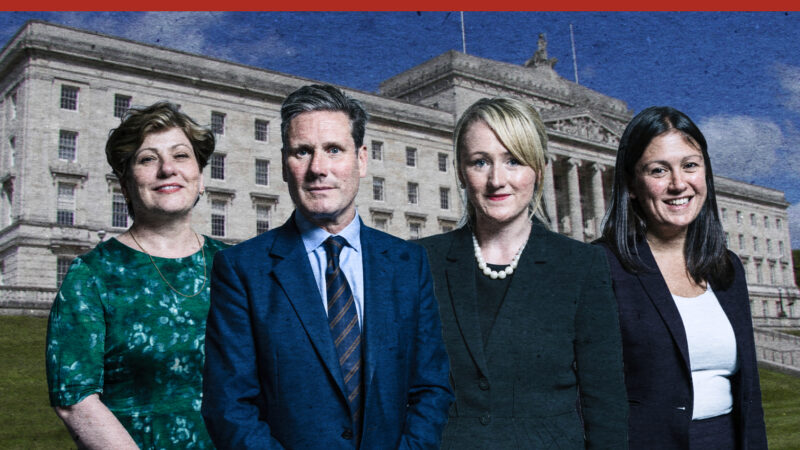
For the last two years, Northern Ireland has played an unusually prominent role in UK politics. The importance of the Irish border in light of Brexit, and role of the DUP as effective members of Theresa May’s government, coupled with the high-profile culmination in parliament of historic campaigns for equal marriage and abortion rights in the North, resulted in more debate on Northern Ireland than at any time in recent memory. Yet, so far in the Labour leadership election, you’d be hard pressed to find much discussion of Northern Ireland, even in the context of Brexit. Why?
It is important to recognise that, from a practical point of view, there is sadly very little to be gained from a potential Labour leader (or deputy) talking about, let alone campaigning in, Northern Ireland. The party stands no official candidates in the six counties and has a single CLP that notionally covers all Labour members living in the North. Meanwhile, Labour members outside of Northern Ireland have little interest in what candidates thinks of issues such as welfare mitigation, the Historical Institutional Abuse Inquiry, safe staffing in Northern Irish hospitals or post-conflict intergenerational trauma. This isn’t to demean Labour members. They simply reflect a broader British public disinterest in Northern Ireland, to which the last few years of debate around Brexit have been an exception.
Still, the prospective candidates are not just running for the position of Labour leader – they are also staking their claim to be the country’s next Prime Minister. Equally, a Labour leader will always be the most prominent representative of the UK’s trade union movement. Both roles require an understanding of the issues facing all parts of the United Kingdom – not just those on one side of the Irish Sea.
The frontrunners, Keir Starmer and Rebecca Long-Bailey, have both pitched themselves as candidates to bring the Labour message back to places where it is no longer heeded, and to help the places left behind by post-Thatcher economics and further crippled by austerity. Yet in Starmer’s promise to ‘tour the regions’ he did not mention N.I. and Long-Bailey’s campaign has sometimes appeared to see only Wales and Scotland as the ‘other nations’ of the UK.
Outside of the frontrunners, Lisa Nandy’s focus on towns might be making good memes, but her platform for regeneration and investment is as relevant to Northern Ireland as it is to Northern England. Although the issue of devolution and the potential for a federal UK has been discussed several times in the contest so far, there has been no indication that any of the candidates have much knowledge of the state of the Stormont executive or how the existing devolved government in the North might integrate into a future, constitutionally reformed UK.
Of course, all leadership elections involve a degree of insular debate and they are by no means guaranteed to cover the same issues that are prominent in national politics. Ultimately, none of the candidates will win or lose the contest based on their views on power-sharing or how the block grant is calculated. But failure to engage with the issues that Northern Ireland shares with other areas of the United Kingdom – let alone a recognition of the unique challenges that the North continues to face – is still a missed opportunity for all involved. Not only would it be a chance for candidates to articulate their ideas in a different way, it would also show a level of political maturity so lacking in our current Prime Minister.
A lack of Labour MPs in Northern Ireland does not mean that the North should not feature in our internal debates. After all, the majority of the UK is represented by non-Labour MPs. For as long as Northern Ireland is part of the United Kingdom, it cannot be ignored by any political leader who is serious about representing the nation as a whole.




More from LabourList
Government announce SEND reform in schools white paper
SPONSORED: ‘Industrial hemp and the challenge of turning Labour’s priorities into practice’
‘A day is a long time in politics, so we need ‘action this day’’